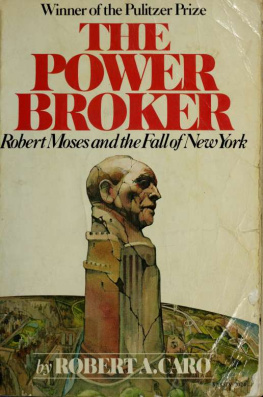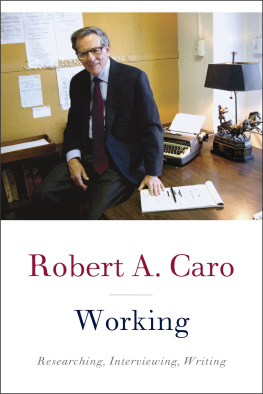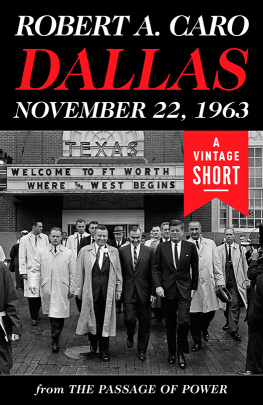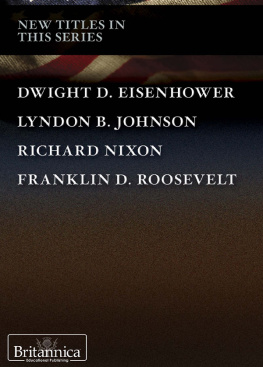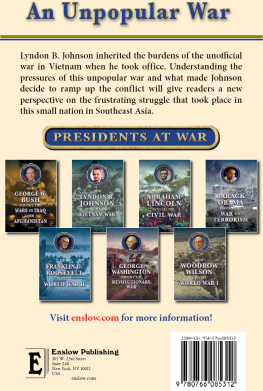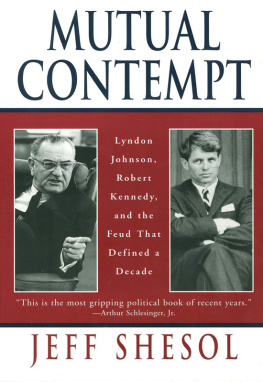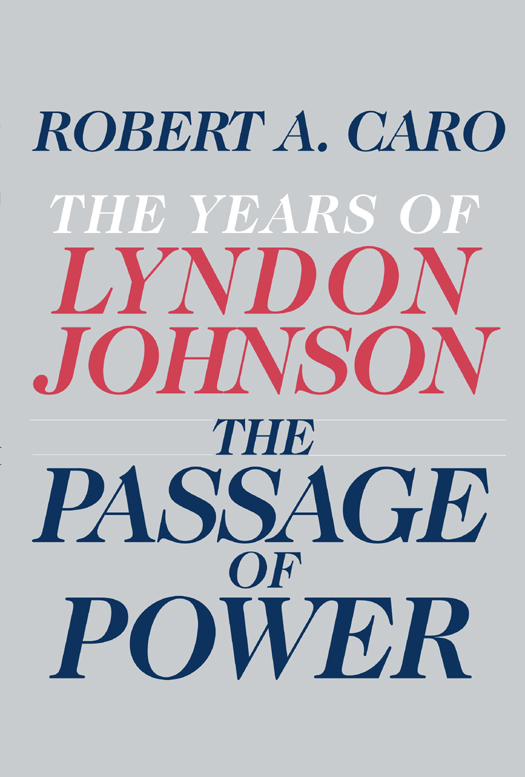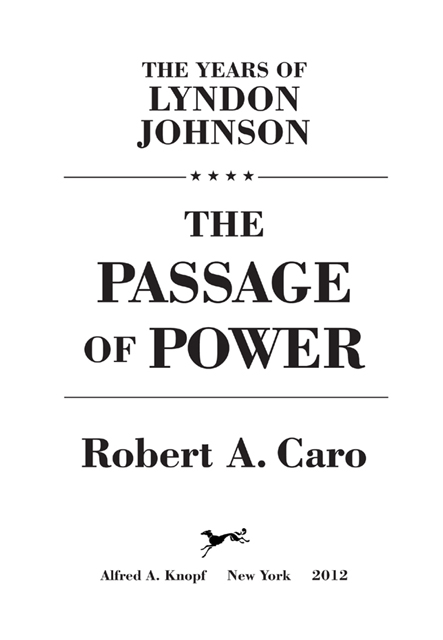THIS IS A BORZOI BOOK
PUBLISHED BY ALFRED A. KNOPF
Copyright 2012 by Robert A. Caro, Inc.
All rights reserved. Published in the United States by Alfred A. Knopf, a division of Random House, Inc., New York, and in Canada by Random House of Canada Limited, Toronto.
www.aaknopf.com
Knopf, Borzoi Books, and the colophon are registered trademarks of Random House, Inc.
A portion of this work was previously published in The New Yorker.
Cataloging-in-Publication Data is on file with the Library of Congress
eISBN: 978-0-307-96046-7
Cover design by R. D. Scudellari, adapted by Carol Devine Carson
First Edition
v3.1_r1
For Ina
and
For Chase and Carla
and
For Barry, Shana and Jesse
With love
Contents
Introduction
What the hells the presidency for?
A IR F ORCE O NE , the Presidents plane, is divided, behind the crews cockpit, into three compartments. In the first of them, just behind the cockpit, women sat weeping and Secret Service agents were trying to hold back tears (Youve heard of strong men crying; well, we had it there that day, recalls a reporter) as the pilot lifted the big jet off the Dallas runway in a climb so steep that to a man standing on the ground it seemed almost vertical, leveled off for a few minutes, and then, warned that there were tornadoes between him and Washington, put the plane into another climb to get above them. In the rear compartment the widow, her suit stained with blood, was sitting next to the coffin of the dead President. And in the center compartment was the new President.
Lyndon Johnson hadnt been aboard Air Force One on the trip down to Texas. He had long since given up asking John F. Kennedy if he could accompany him on the presidential plane when they were flying to the same destination (You dont mean to say that Mr. Johnson is again insisting on riding with me? Kennedy had once asked his secretary in an exasperated tone), as he had given up on all his attempts to obtain some measure of recognition, or at least dignity, as Vice President. Once, as Senate Majority Leader, he had been a mighty figurethe second most powerful man in the countrybut that seemed a long time ago now. Although initially he had been favored to win the Democratic nomination for President, he had been outmaneuvered by the younger man, and, having accepted the vice presidency, had, in that post, become not just powerless but a figure of ridicule. The gibe (Whatever became of Lyndon Johnson?) that had started over Georgetown dinner tables was now in headlines over articles about his predicament. He himself was worried about whether or not he would be retained on the 1964 Democratic ticket, and was convinced that whether he was or not, his dreams of becoming President one day were over. He had advised more than one aide whom he would have wanted with him were he to run for or become President to leave his staff. My future is behind me, he told one member of his staff. Go , he said to another. Im finished. But he was on Air Force One now.
I N PART , this book is the story of the five yearsfrom late 1958, when Johnson began campaigning for the presidency, to November 22, 1963before that flight from Dallas to Washington: a story of how a man who all his life had yearned for the presidency failed in his great chance to attain that goal, of how, to a large degree because of aspects of his character that crippled him in his efforts to attain it, he allowed the prize for which he had planned and schemed and worked (worked with a tirelessness that made an ally say I never thought it was possible for anyone to work that hard) to be snatched away from him. It is a story of not only failure but humiliation, of how, after he had lost the presidential nomination in 1960, he had taken a gamblegiving up the Senate leadership to accept the vice presidential nominationbecause he felt that was his only remaining chance to achieve his goal, and of what followed after he became Vice President. Although Kennedy might not have won in 1960 without his presence on the ticket and his old-fashioned, whistle-stop campaigninga fact that Kennedy himself privately acknowledgedhe received no credit for that. Power is where power goes, he had boasted in explaining why he had traded in the Senate leadership: he would be able, through his political gifts, to transform the traditionally powerless vice presidency. But when, not long after the election, he had made two attemptsone with the Senate, one with Kennedy himselfto grab powers no previous Vice President had enjoyed, both were carried out in ways so clumsy and embarrassing that it was obvious that not his old skills but only desperation was behind them. And during the three years since Kennedy had turned aside, with contemptuous ease, Johnsons attempt to maneuver him into ceding a portion of presidential power, Vice President Johnson had become among Kennedys White House aides the object of dislike and distrust, and of derision embodied in the mocking nicknames by which they often referred to him: Uncle Cornpone or Rufus Cornpone. These nicknames, and a hundred other slights, make this part of the book also a story about what being without power can mean in a city in which power is the name of the game; in a city as cruel as Washington. That part of the storythe five-year parthad ended when Kennedys aide Kenneth ODonnell had walked into the cubicle in Dallas Parkland Hospital in which Lyndon Johnson, standing all but motionless against a wall, had been waiting for long minutes for definitive word on the Presidents fate. Seeing the stricken face of Kenny ODonnell who loved him so much, I knew, Lady Bird Johnson was to say, even before ODonnell said, Hes gone.
And in part this book is the story of a period that began during that flight, for it was on Air Force One, after he had sworn the oath of office with Jacqueline Kennedy standing beside him in a sweltering, dimly lit cabin, its window shades closed to foil would-be assassins, that his first presidential decisions were made: that the transition between the Kennedy Administration and that of Lyndon Baines Johnson began.
T HAT STORY the transition story, a story just seven weeks long: its end came, as will be seen, on January 8, 1964is a story of a period in Lyndon Johnsons life very unlike that of the preceding five years.
Although seven times previously in the history of the American republic a presidential transition had come about not through election but through death, the death of a President in office, and in three of those seven instances, death had come by assassination rather than through natural causes, the Johnson transition took place in circumstances that made it in some ways different fromand in some ways more difficult thanany of its predecessors. The very jolt of the news was different. As the first assassination to take place in the age of television, it was the first an entire nation learned about almost at the same moment: by the time Air Force One touched down in Washington, after a flight of two hours and six minutes, 92 percent of the American people had heard the news, which crossed the country, Newsweek said, like a shock wave. Tens of millions of Americans saw the coffin, escorted by Jacqueline and Robert Kennedy, descend from the plane on an hydraulic lift. And hard on the first shock came others. Forty minutes into Air Force Ones flight, it was announced that a Dallas policeman had been shot, and, a few minutes later, that a twenty-four-year-old man had been arrested for questioning, and a half hour later that he was a definitive suspect in the assassination, and on the heels of Lee Harvey Oswalds name came rumors that seemed to link him to both Cuba and the Soviet Union. With America barely a year past the Cuban Missile Crisis, the fears that had accompanied the realization in October, 1962, that the country was on the very brink of a nuclear confrontation with those two countries were still fresh in Americas mind. And then, two days later, the assassin was assassinatedon live television. The shadowy figure lunging onto the screen from the right; glimpses of a pistol; Hes been shot! Hes been shot! Lee Harvey Oswald has been shot! For one moment of total horror, the


